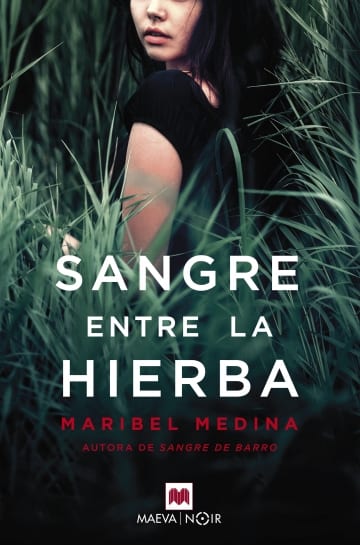
Maribel Medina: the crime novel that denounces the great evils of society.
We are privileged to have today on our blog with Maribel medina, (Pamplona, 1969) creator of Novel trilogy black starring Coroner Laura Terraux and Interpol Agent Thomas Connors. Maribel Medina is founder and current president of the NGO Women´s Time.
«Pablo was pale and was wiping away his tears with a handkerchief.I was glad to see him so sad, I was surprised at that gesture of humanity. I had been wrong to judge him: the Fool had a heart. If he could cry for a dog, he would surely set us free one day. I imagined that those tears were for us, for all the girls whom he kept enslaved. "
(Blood in the grass. Maribel Medina)
Actualidad Literatura: Doping in sports opens the trilogy, continues with corruption in the pharmaceutical industry and human testing in disadvantaged countries, and ends with human trafficking. Three issues of great social impact that question the functioning of the current system. The crime novel as a denunciation of the evils of our society?
Maribel Medina: The crime novel has a background of denunciation and, at that moment, it was what I needed. My writing is my megaphone to shout an injustice. With me it does not go that ignorance is a blessing, I do not like not knowing and I seek the same thing happens to the reader who follows me.
AL: Three different locations: from the Swiss Alps in Sangre de Barro we traveled to India with Untouchable Blood, specifically to the city of Benares, and from there to Peru, in Blood between the Grass, the last installment of the Trilogy. Any reason for such disparate locations?
MM: I want the reader to travel with me. That he knows places that I fell in love with. In addition to being one more protagonist of the novel.
AL: President of the NGO Women´s Time that works for the development of women in India, Nepal, the Dominican Republic and Spain. Dedication to social improvement seems a constant in Maribel's life. Do the intense experiences lived in front of an NGO influence the stories that you later capture in your books?
MM: Absolutely yes. I have lived in India and seen first-hand what Big Pharma does to the poorest. This is how it was born Untouchable blood. I found it fascinating to introduce the reader to a world so far removed from my everyday life. Benares is a city where death comes naturally. You see the elderly waiting for death in the gahts, you watch the smoke from the multiple crematoria overlooking the Ganges, you are outraged by the caste system that still governs. I thought about how you could hunt down a serial killer in a place where the streets are nameless, where many people die without a record. There is more reality than fiction. Large pharmaceutical companies have the figure of the Eliminator, someone who is responsible for covering up bad practices. And one of the protagonists works in an NGO. You see…
AL: What is the main objective of this third novel?
MM: Mabel Lozano spoke of a river in Peru where they dumped dead girls, I investigated in that country and found La Rinconada, hell on earth. It was perfect for me as a reflection of what my characters experience there. The director of a newspaper there, Correo Puno, gave me many clues, as well as some Spanish blogger who had been, the rest is the writer's job to move the reader to that place and shrink him and freeze his heart. It wasn't difficult for me.
The objective is clear, to denounce the slavery of the XXI century; human trafficking. It is intolerable that a country like Spain does not have a law that prohibits prostitution, that leaves in a legal limbo that women can be bought, sold, rented with the approval of politicians. I can't be a surrogate mother, I can't sell a kidney, but I can rent it out. It's ridiculous.

Blood among the grass, the last installment of the Blood trilogy.
AL: A coroner and an Interpol agent as protagonists of the trilogy. Arrive at Laura Terraux and Thomas Connors at the end of the road with the latest installment, Blood in the grass?
MM: For me it was important that the protagonists were not policemen, I am not and I have no idea how to investigate; I wanted my books to be as honest as possible. I like to write about what I know.
That Thomas is a man gives me a brutal game, since the Thomas of my first novel: hedonist, womanizer, selfish, who tiptoes over the lives of others, changes as a result of a fact that turns life upside down. it was perfect. However, Laura is a magnificent forensic, brave, committed, who is clear about what she wants and fights without quarter. If we add to that the attraction that is born between them, it makes a couple's decision the right one.
And yes, it is the end of the road. And I prefer to leave it at the top before the readers retire me.
AL: When topics as hot as those in your books are removed, certain characters or positions can feel singled out. Above all, when it is done with the forcefulness of the data you provide in the novels. Has there been any kind of rejection or negative reaction on the part of any sector of Spanish society?
MM: The biggest complications were with Blood of Mud. My husband was an elite athlete. One day he told me about the price you have to pay to get to the podium. He blew me away. It seemed like a big scam to me. They sell us the Olympic movement as something healthy and perfect, but it is a lie. Behind there are doctors busy taking the athlete to the top. Sports idols are made in a laboratory.
It was arduous and fraught with difficulties. For many leaders doping gives prestige and money, that is, it is not a problem, why would they help me? Luckily some did not think so, such as Interpol Lyon and Enrique Gómez Bastida -the then director of the Spanish Anti-Doping Agency-. It is the only subject where I have been threatened with complaints, and athletes from my husband's environment stopped talking to him.
AL: I never ask a writer to choose between his novels, but we do like it. meet you as a reader. Which that book what do you remember with special honey, what comforts you to see on your shelf? ¿Algaan author that you are passionate about, of which you run to the bookstore as soon as they are published?
MM: The ones I read in my teens. Lord Byron's poems underlined over his phrase "I have the world before me" which seemed great to me. Then Baudelaire and his collection of poems Las flores del mal broke my head: The verse "Your memories framed by horizons" became a purpose of life: I had to eat the world in bites, with no other limit than my own.
But the author who has marked me the most in literary terms was Curzio Malaparte. His books lined my father's nightstand. It took me years to verify the excellence of his poetic-journalist storytelling. Malaparte wrote about the misery of World War II with a unique voice:
"I'm curious to know what I'll find, I'm looking for monsters." His monsters were part of his journey.
At present there are only two authors for whom I have all their publications: John M. Coetzee and Carlos Zanón.
I am still a bookworm and library rat, I love to read all kinds of novels, but I have become very demanding.
AL: What are the special moments of your professional career? Those that you will tell your grandchildren.
MM: The day my literary agency auctioned the Blood of Mud manuscript online. I saw the bid and didn't believe it. It was very exciting, not because of the money, but because of the confirmation that I had something to tell and that it was well done.
AL: In these times when technology is a constant in our lives, it is inevitable to ask about the social media, a phenomenon that divides writers between those who reject them as a professional tool and those who adore them. How do you live it? What do social networks bring you? Do they outweigh the inconvenience?
MM: They look good to me if you control them. That is, if they are not an obligation. I never write personal questions, I do not expose my life. The book is the object, not me.
They allow me a closeness with the readers that otherwise would be very difficult.
AL: Book digital or paper?
MM: Paper.
AL: Does the literary piracy?
MM: I don't think about it. As long as we are governed by illiterate politicians on the cultural issue, there will be no will or laws to penalize it, so it is better to ignore it. That's out of my reach.
AL: To close, as always, I am going to ask you the most intimate question that can be asked of a writer:whyé you write?
MM: I am of late vocation. I think my writing is a consequence of my voracious reading, almost bordering on fanaticism. After forty I started writing and it was a fit of rage rather than need. I wanted to talk about a great injustice and the novel was the medium. Then success forced me to continue. That is why I do not consider myself a writer, just a storyteller. I don't have that addicting need to write.
Thank you Maribel medina, wish you many successes in all your professional and personal facets, that the streak does not stop and that you continue to surprise us and stir our conscience with each new novel.